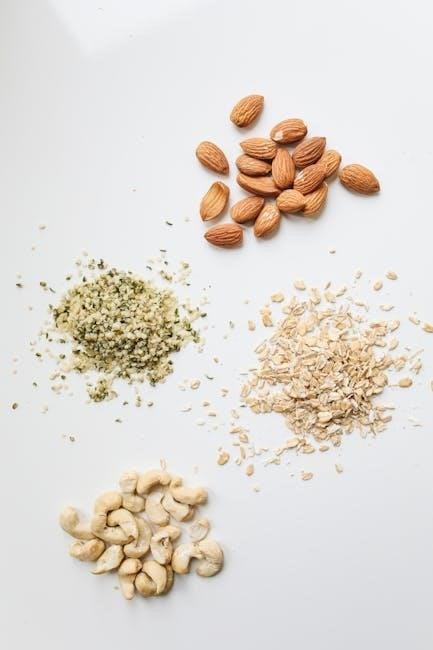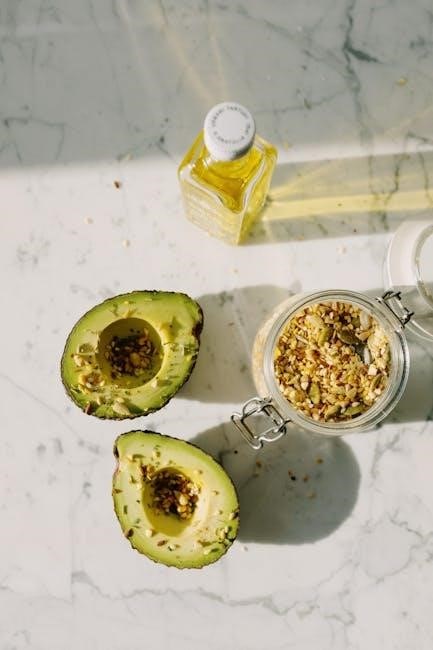A low-carb vegetarian diet combines plant-based nutrition with reduced carbohydrate intake, offering a balanced approach to weight loss and improved health, tailored to various dietary goals.
What is a Low Carb Vegetarian Diet?
A low-carb vegetarian diet is a dietary approach that focuses on reducing carbohydrate intake while avoiding animal products. It emphasizes plant-based foods like vegetables, legumes, nuts, seeds, and healthy fats. The diet restricts high-carb foods such as grains, starchy vegetables, and sugary items. By combining low-carb principles with vegetarian guidelines, it provides a structured way to manage weight, improve health markers, and promote sustainable eating without meat. It’s a balanced approach to nutrition that aligns with ethical and health-driven lifestyle choices.
Why Choose a Low Carb Vegetarian Diet?
A low-carb vegetarian diet is ideal for those seeking weight loss, improved blood sugar control, and enhanced overall health. It combines the benefits of plant-based eating with reduced carb intake, offering a sustainable and ethical lifestyle choice. This diet helps reduce reliance on processed foods, promotes nutrient-dense meals, and supports environmental sustainability. It’s a versatile option for individuals looking to adopt a healthier, meat-free lifestyle without compromising on flavor or nutritional balance. The structured approach makes it easier to maintain long-term health goals.
Benefits of a Low Carb Vegetarian Diet
The low-carb vegetarian diet offers numerous benefits, including weight loss, improved blood sugar levels, and enhanced heart health. It promotes reduced inflammation, increased energy levels, and better digestion. By focusing on whole, nutrient-dense foods, this diet helps minimize cravings and supports long-term sustainability. Additionally, it encourages a higher intake of fiber, vitamins, and minerals, while lowering the risk of chronic diseases like diabetes and hypertension. This balanced approach makes it an excellent choice for those seeking a healthier, more sustainable lifestyle.

Understanding the Low Carb Vegetarian Diet
A low-carb vegetarian diet focuses on plant-based foods, minimizing carbohydrates while emphasizing protein-rich and high-fat ingredients to maintain balance and support overall health goals.
Key Principles of a Low Carb Vegetarian Diet
A low-carb vegetarian diet emphasizes plant-based foods while minimizing carbohydrate intake. Focus on natural, unprocessed foods like vegetables, nuts, seeds, and healthy fats. Eliminate high-carb foods such as grains, starchy vegetables, and sugary items. Prioritize protein sources like legumes, tofu, and eggs, and incorporate healthy fats from avocados, olive oil, and nuts. Stay hydrated and limit processed foods. Meal planning and mindful eating are crucial to maintaining balance and ensuring nutrient intake aligns with dietary goals.
How to Prepare for a Low Carb Vegetarian Meal Plan
Preparing for a low-carb vegetarian diet involves planning meals, creating a shopping list, and understanding which foods to include or avoid. Start by identifying protein sources like legumes, tofu, and eggs, and incorporate healthy fats from avocados, nuts, and seeds. Focus on low-carb vegetables such as leafy greens, broccoli, and cauliflower. Eliminate high-carb foods like grains, starchy vegetables, and sugary items. Stock your pantry with essentials like olive oil, spices, and herbs to enhance flavor without adding carbs. A well-organized plan ensures adherence and success.
Differences Between Low Carb and Traditional Vegetarian Diets
A traditional vegetarian diet often includes high-carb foods like grains, legumes, and starchy vegetables, whereas a low-carb vegetarian diet restricts these, focusing on low-carb vegetables, healthy fats, and plant-based proteins. The low-carb version emphasizes reducing carbohydrate intake, while traditional diets may not limit carbs. This shift requires substituting grains with vegetables and prioritizing fats and proteins, making the low-carb approach more structured for weight loss and blood sugar control, while traditional diets offer more flexibility and variety.
Meal Planning and Preparation
Meal planning is essential for a low-carb vegetarian diet, requiring an organized approach to create balanced, nutritious meals while minimizing carb intake and optimizing flavor.
Weekly Meal Planning Tips
Plan your meals weekly to ensure balanced nutrition and variety. Start by listing low-carb vegetarian options like leafy greens, legumes, and healthy fats. Create a shopping list to avoid impulse buys. Prep meals in advance to save time and stay consistent. Incorporate protein-rich foods like tofu, tempeh, and lentils. Rotate ingredients to keep meals exciting and nutrient-dense. Stay hydrated and consider meal prepping for lunches and snacks. Organize your schedule to maintain adherence and enjoy the process of creating delicious, healthy meals.
Grocery Shopping List for a Low Carb Vegetarian Diet
Stock up on low-carb vegetables like spinach, broccoli, and cauliflower. Include healthy fats such as avocados, nuts, and seeds. Protein sources like tofu, tempeh, lentils, and chickpeas are essential. Eggs and Greek yogurt are great for breakfast. Olive oil, coconut oil, and herbs add flavor. Fermented foods like kimchi and sauerkraut support gut health. Don’t forget low-carb grains like almond flour and flaxseed. Incorporate dairy alternatives and sweeteners like stevia for desserts. This list ensures a balanced and satisfying low-carb vegetarian diet.
Essential Kitchen Items for Low Carb Vegetarian Cooking
A well-equipped kitchen is key to successful low-carb vegetarian cooking. Start with a sharp chef’s knife and cutting board for vegetable prep. A food processor or spiralizer is handy for creating low-carb alternatives like zucchini noodles. Non-stick pans and baking sheets are ideal for cooking without excess oil. A steamer helps retain nutrients in vegetables. Measuring cups and spoons ensure precise portion control. Storage containers are perfect for meal prep, while a vegetable peeler and electric mixer simplify recipe preparation. These tools make low-carb vegetarian cooking efficient and enjoyable.
Foods to Include in a Low Carb Vegetarian Diet
Focus on non-starchy vegetables, healthy fats like avocados, nuts, and seeds, and plant-based proteins such as tofu, legumes, and eggs for a balanced low-carb vegetarian diet.
Low Carb Vegetables
Low-carb vegetables are essential for a balanced diet, providing essential nutrients and fiber. Opt for non-starchy varieties like spinach, broccoli, cauliflower, zucchini, asparagus, bell peppers, and mushrooms. These vegetables are rich in vitamins, minerals, and antioxidants, supporting overall health and satiety. Incorporate them into salads, stir-fries, or as standalone sides. Their low carbohydrate content makes them ideal for maintaining a low-carb regimen while ensuring you meet your nutritional needs. Pair them with healthy fats for enhanced flavor and digestion.
High-Protein, Low-Carb Plant-Based Foods
High-protein, low-carb plant-based foods are crucial for satisfying meals. Tofu, tempeh, and edamame are excellent sources of protein with minimal carbs. Seitan, made from wheat gluten, offers a meaty texture and high protein content. Lentils and chickpeas are versatile legumes with balanced protein and carbs. Black beans, kidney beans, and quinoa also provide ample protein while keeping carbs manageable. These foods are perfect for creating filling and nutritious meals, ensuring you meet your protein needs without exceeding carbohydrate limits. Incorporate them into stir-fries, salads, or as standalone dishes for a balanced diet.
Healthy Fats and Oils for a Low Carb Diet
Healthy fats and oils are essential for a low-carb vegetarian diet, providing energy and supporting overall health. Avocados, olive oil, and coconut oil are rich in monounsaturated and saturated fats, promoting heart health. Nuts like almonds, walnuts, and flaxseeds offer omega-3 fatty acids and fiber. Seeds such as chia, hemp, and pumpkin are excellent sources of healthy fats and protein. These fats enhance meal satisfaction and help maintain a balanced diet without exceeding carb limits, making them a crucial component of your low-carb vegetarian meal plan.
Foods to Avoid on a Low Carb Vegetarian Diet
High-carb foods like bread, pasta, sugary snacks, and starchy vegetables should be avoided. Limit processed foods, legumes, and refined grains to maintain a low-carb, plant-based diet effectively.
High-Carb Vegetarian Foods to Limit
Vegetarians should limit high-carb foods such as grains, legumes, starchy vegetables, and sugary snacks. Foods like bread, pasta, rice, and potatoes are high in carbs and can hinder low-carb goals. Legumes like lentils and chickpeas, while nutritious, are also carb-dense. Opt for low-carb alternatives like cauliflower rice or zucchini noodles. Additionally, avoid sugary fruits and juices, as they can spike carbohydrate intake. Focus on non-starchy vegetables, nuts, and seeds to stay within low-carb guidelines while maintaining a balanced diet.
Processed Foods to Avoid
Processed foods are often high in carbs, added sugars, and unhealthy fats, making them unsuitable for a low-carb vegetarian diet. Avoid items like refined snacks, frozen meals, and sugary treats. Many vegetarian processed products, such as veggie burgers and breaded items, contain high-carb fillers. Opt for whole, unprocessed foods like vegetables, nuts, and seeds instead. Limit packaged goods and always check nutrition labels for hidden carbs and sugars to maintain your dietary goals and ensure a healthier, more balanced meal plan.
Sugary Foods and Drinks to Exclude
Sugary foods and drinks are high in empty calories and carbs, hindering weight loss and overall health. Exclude items like soda, candy, pastries, and sweetened beverages. Even natural sources like fruit juices and dried fruits should be limited due to their high sugar content. Opt for whole fruits or small portions of low-sugar options like berries. Avoid sweetened yogurts, honey, and maple syrup. Instead, choose unsweetened alternatives to keep your diet low in sugar and aligned with your low-carb goals for better health outcomes.
Sample 7-Day Low Carb Vegetarian Meal Plan
Discover a 7-day meal plan featuring delicious, plant-based recipes designed to support weight loss and overall health, with structured breakfast, lunch, and dinner ideas for each day.
Day 1: Breakfast, Lunch, and Dinner Ideas
- Breakfast: Spinach and feta omelette with a side of avocado slices for healthy fats.
- Lunch: Mixed vegetable salad with grilled tofu, olive oil, and a sprinkle of seeds.
- Dinner: Zucchini noodles (zoodles) with pesto sauce and cherry tomatoes.
- Snacks: Celery sticks with almond butter or a cucumber slice with hummus.
This meal plan focuses on fresh, low-carb ingredients, ensuring a balanced and satisfying start to your week.
Day 2: Breakfast, Lunch, and Dinner Ideas
- Breakfast: Spinach and avocado smoothie with almond milk, topped with chia seeds.
- Lunch: Stuffed bell peppers with quinoa, black beans, and diced vegetables.
- Dinner: Vegetable stir-fry with tofu, served with a side of cauliflower rice.
- Snacks: A small handful of mixed nuts or mozzarella cheese.
This meal plan emphasizes variety and nutrient-dense options, keeping carbs low while maintaining flavor and satisfaction throughout the day.
Day 3: Breakfast, Lunch, and Dinner Ideas
- Breakfast: Spinach and mushroom frittata with a side of sliced avocado.
- Lunch: Mixed green salad with chickpeas, cherry tomatoes, cucumber, and a lemon-tahini dressing.
- Dinner: Grilled zucchini boats stuffed with ricotta and spinach, served with roasted green beans.
- Snacks: Celery sticks with almond butter or a small portion of mozzarella cheese.
This meal plan focuses on nutrient-dense, flavorful dishes that keep carbs low while providing plenty of variety and satisfaction throughout the day.
Day 4: Breakfast, Lunch, and Dinner Ideas
- Breakfast: Smoked tofu scramble with sautéed spinach, mushrooms, and a sprinkle of nutritional yeast.
- Lunch: Cauliflower rice bowl with roasted vegetables (bell peppers, broccoli, and zucchini) and a tahini-lemon dressing.
- Dinner: Stuffed bell peppers with quinoa, black beans, diced tomatoes, and avocado slices.
- Snacks: Cucumber slices with hummus or a handful of raw almonds.
This meal plan balances protein, healthy fats, and low-carb vegetables, ensuring variety and nutrients while staying within dietary goals.
Day 5: Breakfast, Lunch, and Dinner Ideas
- Breakfast: Spinach and feta stuffed zucchini boats, baked until tender and flavorful.
- Lunch: Mixed green salad with avocado, cherry tomatoes, and a grilled eggplant slice, dressed with olive oil and lemon.
- Dinner: Grilled portobello mushrooms with roasted asparagus and a side of cauliflower mash.
- Snack: A small serving of mozzarella cheese sticks or raw veggies with guacamole dip.
This meal plan focuses on fresh vegetables, healthy fats, and plant-based proteins, ensuring a delicious and satisfying low-carb vegetarian day.
Day 6: Breakfast, Lunch, and Dinner Ideas
- Breakfast: Tofu scramble with sautéed kale, bell peppers, and mushrooms, served with a side of roasted cherry tomatoes.
- Lunch: Chickpea and arugula salad with sliced avocado, olives, and a lemon-tahini dressing.
- Dinner: Grilled eggplant parmesan with zucchini noodles and a side of steamed green beans.
- Snack: A handful of almonds or a small serving of cottage cheese with raspberries.
This day’s meals emphasize protein-rich plant-based ingredients, vibrant vegetables, and healthy fats, ensuring a balanced and satisfying low-carb vegetarian experience.
Day 7: Breakfast, Lunch, and Dinner Ideas
- Breakfast: Spinach and feta quiche with a side of roasted tomatoes and avocado slices.
- Lunch: Lentil and vegetable stir-fry with broccoli, bell peppers, and a drizzle of sesame oil.
- Dinner: Stuffed portobello mushrooms with goat cheese, garlic, and herbs, served with roasted asparagus.
- Snack: A small handful of macadamia nuts or a side of cucumber slices with hummus.
This final day of the meal plan focuses on hearty, flavorful dishes that are rich in nutrients and low in carbs, ensuring a satisfying conclusion to your week-long plan.
Low Carb Vegetarian Snacks and Desserts
Indulge in low-carb snacks like roasted nuts, veggie sticks with hummus, and cheese. For desserts, opt for sugar-free chocolate mousse or chia pudding with berries.
Healthy Snack Options
Low-carb vegetarian snacks are both nutritious and delicious. Opt for roasted nuts, veggie sticks with hummus, or a small portion of cheese. Almond butter paired with celery sticks or cucumber slices makes for a satisfying treat. For something crunchy, try kale chips or veggie-based snacks like zucchini chips. Fresh berries with a dollop of unsweetened Greek yogurt are a sweet and healthy option. Hard-boiled eggs or a handful of olives are great protein-rich snacks. Ensure all snacks are portion-controlled to maintain low carb intake while staying nourished.
Low Carb Vegetarian Dessert Recipes
Indulge in guilt-free, low-carb vegetarian desserts with creative recipes. Berry chia pudding made with fresh berries and almond milk is a sweet treat. Zucchini brownies or almond flour cookies satisfy cravings without excess carbs. Cashew cheesecake with a nut-based crust offers a creamy delight. Explore sugar-free options like dark chocolate-dipped fruit or coconut macaroons for a healthier dessert. These recipes use natural sweeteners and protein-rich ingredients, ensuring they align with your low-carb goals while delivering delicious flavor and satisfaction.

Tips for Success on a Low Carb Vegetarian Diet
- Plan meals in advance to avoid carb-rich options.
- Track macronutrients to ensure balanced nutrition.
- Stay hydrated and listen to your body’s needs.
Staying Motivated on a Low Carb Diet
Staying motivated on a low-carb diet requires setting realistic goals and celebrating small victories. Tracking progress, whether through weight loss or improved health markers, can boost confidence. Surround yourself with supportive communities or online forums to share experiences and gain inspiration. Meal prepping and exploring new recipes can keep the diet exciting. Remember, consistency is key, and focusing on long-term benefits rather than short-term challenges will help maintain motivation. Embrace the journey and remind yourself of the positive changes it brings to your health and well-being.
Overcoming Challenges on a Low Carb Vegetarian Diet
One common challenge is ensuring adequate protein intake without exceeding carb limits. Incorporating high-protein, low-carb plant-based foods like tofu, tempeh, and legumes can help. Another hurdle is avoiding carb-rich vegetarian staples such as grains and starchy vegetables, which requires careful meal planning. Additionally, social situations may pose difficulties, but preparing low-carb alternatives ensures compliance. Staying informed and seeking support from online communities or dietitians can also help navigate these challenges effectively, making the diet more sustainable and enjoyable in the long term.
How to Create a Low Carb Vegetarian Diet Plan PDF
Design a personalized low-carb vegetarian diet plan by selecting recipes, tracking macros, and organizing meals weekly. Use PDF tools to compile and customize your plan effectively.
Steps to Design a Personalized Meal Plan
To create a tailored low-carb vegetarian meal plan, start by assessing your dietary needs and goals. Select recipes that align with your preferences and carb limits. Calculate the macronutrient breakdown for each meal to ensure balance. Organize your plan into daily or weekly sections, including breakfast, lunch, dinner, and snacks. Use a PDF design tool to format your plan visually, making it easy to follow. Add grocery lists and cooking tips for convenience. Regularly review and adjust based on progress and preferences.
Tools and Resources for Creating a Diet Plan PDF
Utilize meal planning tools like MyFitnessPal or Yummly to track carbs and generate recipes. Canva or Adobe Acrobat can design visually appealing PDFs. Websites like Diet Doctor offer sample plans and expert guidance. Incorporate grocery lists and nutritional breakdowns using spreadsheets. Ensure your PDF is organized with clear sections and images for readability. These tools help create a personalized, structured, and easy-to-follow low-carb vegetarian diet plan tailored to your needs and preferences, ensuring a seamless transition to a healthier lifestyle.

Common Mistakes to Avoid on a Low Carb Vegetarian Diet
Overlooking protein sources, neglecting fiber intake, relying on processed foods, and ignoring nutritional deficiencies like vitamin B12 are common errors that can hinder success on this diet.
Pitfalls in Meal Planning
Common mistakes include relying too heavily on processed foods, failing to balance macronutrients, and neglecting essential nutrients like vitamin B12 and iron. Overlooking the carb content in plant-based proteins and not planning for enough variety can lead to boredom or nutrient deficiencies. Additionally, assuming all vegetarian meals are low in carbs can result in consuming high-carb foods unintentionally. Proper meal planning requires careful consideration of protein sources, healthy fats, and low-carb vegetables to ensure sustained energy and overall health.
Nutritional Deficiencies to Watch Out For
A low-carb vegetarian diet can sometimes lack essential nutrients like vitamin B12, iron, and omega-3 fatty acids, which are often found in animal products. Plant-based iron sources, such as spinach and beans, may not be as easily absorbed, requiring vitamin C-rich foods to enhance absorption. Additionally, zinc and calcium intake may be insufficient if not carefully planned. Regularly incorporating fortified foods or supplements can help prevent these deficiencies and ensure overall nutritional balance while maintaining a low-carb, plant-based lifestyle.
Long-Term Sustainability of a Low Carb Vegetarian Diet
A well-planned low-carb vegetarian diet can be maintained long-term by incorporating diverse, nutrient-rich foods and ensuring adequate protein and healthy fats to sustain energy and satisfaction.
Maintaining a Balanced Diet
Maintaining a balanced diet on a low-carb vegetarian plan requires careful attention to nutrient intake. Focus on whole, unprocessed foods like vegetables, legumes, and healthy fats. Ensure adequate protein from sources such as tofu, lentils, and eggs. Incorporate a variety of colorful vegetables to meet vitamin and mineral needs. Healthy fats from avocados, nuts, and olive oil support heart health and satiety. Regular meal planning and consultation with a dietitian can help prevent nutrient deficiencies and promote long-term sustainability. A balanced approach ensures overall health and well-being while adhering to low-carb principles.
Transitioning to a Long-Term Low Carb Lifestyle
Transitioning to a long-term low-carb lifestyle involves gradual adjustments and sustainable habits. Start by identifying your dietary goals, whether weight loss, improved health, or overall wellness. Incorporate a variety of low-carb, plant-based meals to keep your diet interesting and prevent boredom. Plan meals in advance and stock your pantry with essential low-carb ingredients. Seeking support from online communities or a dietitian can also help maintain motivation. Consistency is key to making low-carb eating a lasting part of your lifestyle.
A low-carb vegetarian diet offers a sustainable path to weight loss and improved health, providing balanced nutrition and flexibility for long-term success.
Final Thoughts on the Low Carb Vegetarian Diet
A low-carb vegetarian diet is a flexible and sustainable choice, offering a variety of plant-based foods to support weight management and overall health. By focusing on whole, nutrient-dense ingredients, individuals can enjoy delicious meals while staying within low-carb guidelines. This approach not only aids in weight loss but also promotes long-term well-being. With proper planning, it’s easy to maintain a balanced and satisfying low-carb vegetarian lifestyle, making it an excellent option for those seeking a healthier way of eating.
Encouragement for Starting the Diet
Embracing a low-carb vegetarian diet is a great step toward a healthier lifestyle. With its focus on whole, nutrient-rich foods, this plan offers a balanced and sustainable way to achieve your weight and wellness goals. It’s easy to get started, and the variety of delicious, plant-based meals ensures you’ll stay satisfied and motivated. Remember, small changes today can lead to big results tomorrow. Take the first step confidently, knowing you’re investing in your long-term health and well-being.

Additional Resources
Explore recommended books, websites, and online communities for comprehensive guides, expert advice, and supportive forums to enhance your low-carb vegetarian journey and meal planning success.
Recommended Books and Websites
For a comprehensive guide, explore books like Keto Vegetarian Cookbook for Beginners and Vegetarian Diet Book, offering diverse low-carb recipes and meal plans. Websites like Diet Doctor and EatingWell provide expert-approved meal ideas, shopping lists, and tips tailored for vegetarians. These resources ensure a well-rounded approach to adopting and maintaining a low-carb vegetarian lifestyle, helping you achieve your health and weight-loss goals effectively.
- Books: Keto Vegetarian Cookbook for Beginners, Vegetarian Diet Book
- Websites: Diet Doctor, EatingWell
Online Communities and Forums
Engage with online communities and forums dedicated to low-carb vegetarian lifestyles for support, recipes, and advice. Platforms like Reddit’s r/lowcarbvegetarian and specialized Facebook groups offer shared experiences and motivation. Websites such as Diet Doctor and EatingWell host forums where experts and members discuss meal planning, challenges, and successes. These resources foster connection and provide practical tips for maintaining a low-carb vegetarian diet effectively.
- Reddit: r/lowcarbvegetarian
- Facebook Groups: Low-Carb Vegetarian Support
- Forums: Diet Doctor, EatingWell


